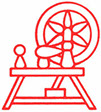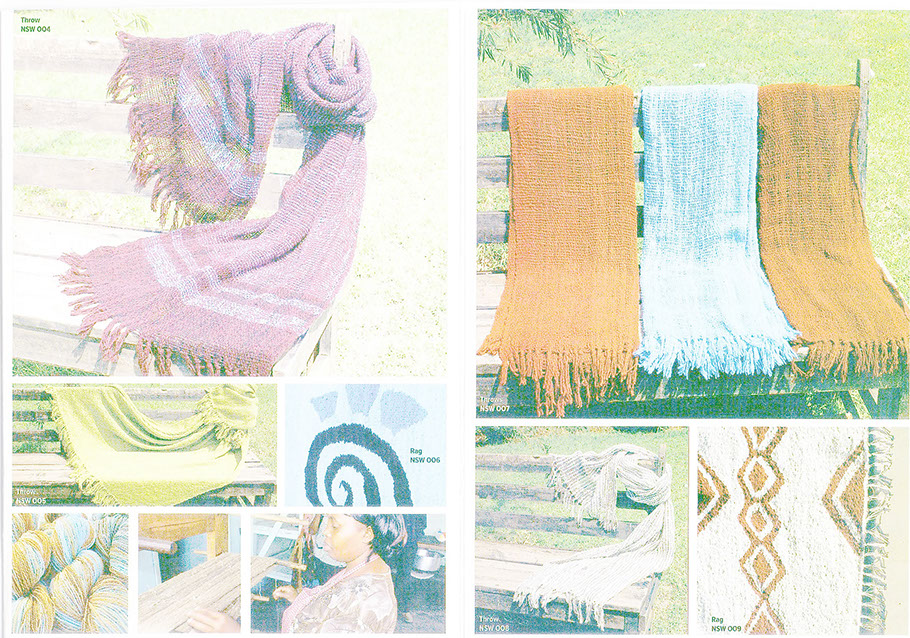



BACKGROUND INFORMATION
It is a women self help project registered under the Ministry of Culture and Social Services started under the umbrella of the Presbyterian Church of East Africa on the 4th July 1977. Basically it was started with the main aim of training poor, windowed and single women living in the surrounding villages of Nanyuki town in the craft of Spinning, Knitting and Weaving with the main objective of making them self reliant. Nanyuki town was targeted because it is one of the major wool producing areas in Kenya its weather being favourable for sheep rearing and raising. It was agreed from the beginning of the project that half of the proceeds acquired would go directly to the women under the project and the other half would be retained at the centre.
ESTABLISHMENT
The Presbyterian Church of East Africa in Nanyuki allowed the first building to be constructed in its compound by the American Embassy in Kenya through the funding of the Presbyterian Church of America in 1977 and on the same year, the Nanyuki local community held a fund raising and realized $100 which was used to buy Spinning and Weaving equipment. The large scale farmers around Nanyuki donated wool. It was there after that the first six women were recruited and started being trained in the craft of Spinning, Knitting and weaving. In 1979 the Canadian Embassy funded the construction of a washing and dyeing room and also a verandah which was to be used as the display shop for the finished products for the customers. Due to the expansion of the centre and the limitation of the church compound, the Nanyuki Municipal Council was requested to donate land to the project and in Dec 1981 it gave out 3.5 acres of land which were immediately utilised by planting dye plants. In 1982 the District Development Office constructed the weaving house in the newly acquired land and in the same year the British Embassy funded the construction of the Carding house where Care Kenya International placed a power carding machine. In 1988 the centre decided to build an administration block from its share of proceeds and the construction was completed in 1995. The need for a large showroom was realized as the production increased and a loan was acquired from one of one of the Ecumenical Organizations in the country which was used to construct a large showroom to display the products and standard washrooms for the customers coming to visit the centre. The loan was repaid in six years. Over 282 women have been trained at the centre to date with 137 of those at the center now with the others starting their own projects in other parts of the country and some selling spun yarn to weavers and knitters to form the sister groups.
CHALLENGES
The centre has experienced its share of challenges through out its existence that has pulled back the mission sometime to its near close down. ? Since the 1998 Nairobi terrorist attack, Kenya was given a travel ban by the International community and the larger percentage of the customers being foreign tourists the project has been without good market for its finished products. ? With the lack of sufficient market, the centre has been unable to recruit new members for training and has been loosing most of the sisters to unemployment when it cannot sustain them.
ACHIEVEMENTS
- Nanyuki Spinners and Weavers has been able to train over 282 women in the craft of Spinning ,Knitting, Dyeing and Weaving with some venturing into private projects and earning their living and that of their family.
- Most women have been able to move from being squatters in the villages they lived to acquiring their own pieces of land and building their homes.
- Most of the women have been able to educate their children through Primary schools to High schools and some have taken their children even to University level from their share of proceeds.
- Nanyuki Spinners and Weavers have been able to provide its sister groups members with raw materials and encouraged them to sell their products through the display shop for those who have not established reliable market for their products The women who have ventured into private businesses have offered employment to other women around Nanyuki town and other parts of the country helping them too earn their living.
- The sister groups members who have embarked on selling wool and spun yarn have always been given first priority when purchasing raw materials in order to keep them in business.
- The women's social lives both at the center and outside have been enhanced through consistent reminding of the value of good morals the project having a strong church background.
- Nanyuki Spinners and weavers have established good relationship with a few people from around the world who have continued to support the project through giving market for the products or helping in searching for market in their parts of the globe.
- The initiation of planting trees around the project?s plot is viewed as a way of contribution towards the environment conservation course. It boast of having to use locally available raw materials from the Mount Kenya Highlands to bring beautiful African designs of Carpets, Shawls, Cardigans, Throws, Pullovers, Scarves and Bed covers into many contemporary homes.
